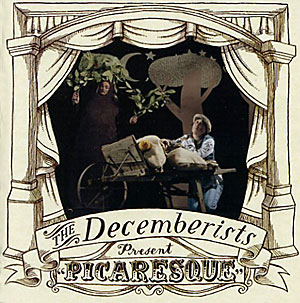Arizona Daily Wildcat
Thursday, March 31, 2005
Print this
'Guero' offers vintage Beck
Because you're human, and because the page is designed that way, you've probably already seen the rating for this record. It's not very high. In fact, it's about half of what it could be, which makes it kind of an accurate representation of my feelings about how good this record could have been.
It's not that there is some great album buried beneath Guero's mediocrity; there isn't. I just can't help but think about the things that justify the anticipation that preceded this record's release. 1999's Midnite Vultures, for one, all acid-flavored funk and Memphis horns. But one of the great things about Beck, and something that always protected him from accusations of dilettantism, is that he can write a simple, beautiful song. Sea Change, for example, saw him trading up Vultures' robot soul non sequitur for bare-bones semi-acoustic ballads. It was unexpected, but came off perfectly.
Unfortunately Beck's pluralistic style seems to have finally turned back on itself. Guero harkens back to his sound on Odelay, replete with sampled beats and Dust Brothers production. But there's something missing this time through.
The first single, "E-Pro," hinges on a single riff and a drum sample snagged from the Beastie Boys' "So What'cha Want." The song's lazy "na na na" chorus sounds like a faded echo of Odelay's "Hotwax," instead of the intended pop/rock ebullience.
"Missing" is a decent track, but it highlights one of the main problems of Guero: it's too easy. Middle-Eastern strings weave in and out of the track, playing counterpoint to the chorus and bridge's staccato delivery. It's fine, basically, but there is no risk, nothing that really makes you wonder what the next song sounds like, or what will happen when the bridge hits. After a string of mostly good, unexpected records, I'd rather hear a failed experiment than a "return" to form.
Mark Sussman
Arizona Daily Wildcat
 |
|
Picaresque: The Decemberists10 / 10
|
|
|
The Decemberists present a masterpiece
Portland, Ore.'s The Decemberists were praying for a miracle with the release of their stunning third full length, Picaresque. Or so it would seem as they chose The Prescott Church to record in.
Why a band that has already released two brilliant albums (2002's Castaways and Cutouts and 2003's Her Majesty the Decemberists) would think divine inspiration was necessary is beyond me. As the full title -The Decemberists Present Picaresque - suggests, the album is another perfect slice of their wonderfully tongue-in-cheek brand of music.
The album opens, in grandiose fashion, with the bombastic majesty of "The Infanta." The song is all chugging drums and charging rhythm as singer and guitarist Colin Meloy harkens back a couple dozen centuries.
"Here she comes in her palanquin/ on the back of an elephant/ On a bed made of linen and sequins and silk."
The standout tracks on the album are too numerous to number, a safe estimate would be all of them, but "We Both Go Down Together" is certainly one of the most romantic and heartbreaking odes to suicidal pacts ever put on record. The violin stabs and Meloy's wavering tremble perfectly accompany the painful lyrics of a young woman led astray to her doom.
"You come from parents wanton/ A childhood rough and rotten/ I come from wealth and beauty/ Untouched by work or duty. And oh my love, my love/ We both go down together."
The longer tracks seem to revel in their epic length and allow Meloy even more room to flaunt his amazing pension for setting a short story to music. "The Bagman's Gambit" quietly wanders through its story (this one is about governmental intrigue, deception and love) with the exception of its few perfectly orchestrated outbursts of guitar clash and drum crash.
"The Mariner's Revenge Song" shows the band's unbelievable talent and ability to captivate for an excess of eight minutes, particularly because the song was apparently done live in one take. The song plunges, with the help of Jenny Conlee's accordion, into the belly of a whale and transitions from frenzied to vicious waltzes. Meloy's superb lyricism perfectly accompanies the meshing instruments and creates an intriguing atmosphere. The listener is thoroughly absorbed as the tale unfolds with both characters trapped in the whale's belly.
"But oh what providence/ What divine intelligence/ That you should survive as well as me."
Firing on all cylinders, the Decemberists even seem comfortable when stepping outside of their theatrical mode in favor of pure pop perfection, such as in "The Sporting Life" and "16 Military Wives." While the former is a fun and sunny strummed acoustic sing-along, the latter is their most upbeat and relevant attack on politics and military policies. As Conlee's organ hums and Chris Funk's guitar twangs, Meloy sings a pleasantly melodic critique on the state of things.
"Because America can/ And America can't say 'No'/ And America does/ If America says it's so."
While the criticism may be that Meloy and company's brand of theatrical music could grow tiresome, this album thoroughly dispels any such fears. Like all great albums, Picaresque reveals its subtleties and intricacies with each listen. However, from the first listen Meloy's brilliantly crafted tales of love, murder and longing create a comfortable and familiar feeling that remains each successive time through.
Here is a band that is not only on top of their game, but making the kind of music they should be time and again. Apparently, they are praying in all the right places.
Michael Pettiti
Arizona Daily Wildcat
 |
|
Lullabies to Paralyze: Queens of the Stone Age
6 / 10
|
|
|
Queens of the Stone Age paralyzed in place
If Queens of the Stone Age were a football player, they would be a middle linebacker. Unflinching, they are never afraid to take or give a hit.
Examples of taking a hit include dropping permanent and temporary members from their lineup, Nick Oliveri (bass) and Dave Grohl (drums) respectively. However, they also deliver the hits on demand, case in point being singles "No One Knows" and "Go with the Flow" from 2002's Songs for the Deaf, which saw significant radio and television success.
This sets them up nicely for a major breakout with their latest release, Lullabies to Paralyze. And while the album does not completely deliver on the band's potential or further their sound, it does little to tarnish their image as one of rock's smartest and cockiest music makers.
Frontman Josh Homme and crew, which now consist of drummer Joey Castillo (Danzig) and Troy Van Leeuwen (A Perfect Circle), as well as a revolving cast of supporting characters, tear through 14 tracks of creepy and fuzzed out guitar rock with only a few stumbles and misfires along the way.
Lead single "Little Sister" is all cowbell and fire alarm guitar up to its viciously frantic conclusion. Homme proves himself a remarkable and technically proficient guitarist throughout the album.
Meanwhile, "Tangled Up in Plaid" employs a plodding guitar line that's complimented with some horror show sounds and Homme's falsetto vocals. It leads to the chorus, which is pulsating rhythm and soaring vocals and Homme's usual dark lyrics.
"I could keep you all for myself/ I know you gotta be free/ So kill yourself."
Much has been made about the "star power" Homme utilized on this album, but the contributions are minimal. Homme realizes the potential for humor behind the guest slot and, with a few exceptions, seems to relish in wasting volunteering talent.
Shirley Manson (Garbage) and Brody Dalle (The Distillers) are background noise, at best, on "You've Got a Killer Scene There, Man ..." Jack Black provides some handclaps and foot stomps on a couple songs that sound, not surprisingly, like handclaps and foot stomps. However, one of the potent contributions comes from Billy F. Gibbons (ZZ Top), who perfectly immerses himself in the distorted guitar haze and choked, bluesy vocals of "Burn the Witch."
"Ask yourself/ Will I burn in hell?/ And write it down/ And cast it in the well."
While the Queens are well equipped with humor, some of their more serious indulgences are a little less acceptable, particularly their fondness for repetition. "In My Head" rides its humming guitar and sing-song vocals ad nauseum. "Someone's in the Wolf" features some of the album's premier guitar chops, but at nearly seven minutes it suffers from droning repetition.
In the end, Lullabies to Paralyze furthers the Queens of the Stone Age's mission for domination in the rock game. However, certain setbacks and missteps find them pinned on the goal line.
Michael Petitti
Arizona Daily Wildcat
